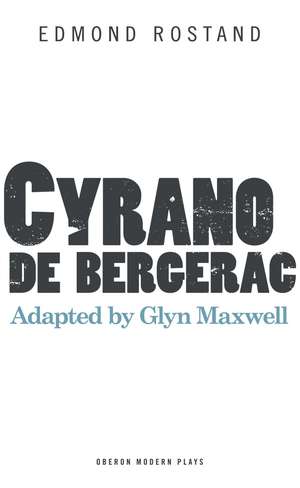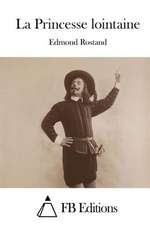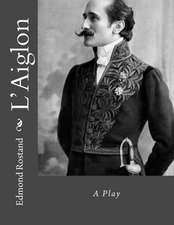Cyrano de Bergerac: Oberon Modern Plays
Autor Edmond Rostand Adaptat de Glyn Maxwellen Limba Engleză Paperback – 10 iul 2013
| Toate formatele și edițiile | Preț | Express |
|---|---|---|
| Paperback (21) | 33.41 lei 3-5 săpt. | |
| Bantam Books – 31 oct 1950 | 33.41 lei 3-5 săpt. | |
| Signet Classics – 29 feb 2012 | 33.82 lei 3-5 săpt. | |
| OUP OXFORD – 14 aug 2008 | 42.01 lei 10-16 zile | +14.40 lei 4-10 zile |
| Penguin Books – 28 iun 2006 | 52.33 lei 24-30 zile | +17.70 lei 4-10 zile |
| – | 65.11 lei 3-5 săpt. | |
| Bloomsbury Publishing – 7 mai 2007 | 67.83 lei 3-5 săpt. | |
| – | 74.64 lei 3-5 săpt. | |
| NICK HERN BOOKS – 7 aug 1991 | 81.90 lei 3-5 săpt. | +9.34 lei 4-10 zile |
| EMPIRE BOOKS – 31 oct 2011 | 92.86 lei 3-5 săpt. | |
| – | 64.00 lei 6-8 săpt. | |
| SMK Books – 11 ian 2012 | 64.17 lei 6-8 săpt. | |
| CREATESPACE – | 73.30 lei 6-8 săpt. | |
| Bloomsbury Publishing – 10 iul 2013 | 78.62 lei 6-8 săpt. | |
| Echo Library – 7 mai 2007 | 104.50 lei 38-44 zile | |
| Alpha Editions – 6 iun 2022 | 106.32 lei 6-8 săpt. | |
| Binker North – 31 oct 2019 | 112.40 lei 38-44 zile | |
| Broadway Play Publishing Inc – 21 mar 2023 | 129.57 lei 6-8 săpt. | |
| Simon & Brown – 31 oct 2011 | 133.18 lei 38-44 zile | |
| Book Jungle – 12 mar 2008 | 166.72 lei 6-8 săpt. | |
| TREDITION CLASSICS – 31 oct 2011 | 183.55 lei 6-8 săpt. | |
| Rostand Press – 14 mar 2007 | 226.23 lei 6-8 săpt. | |
| Hardback (2) | 170.37 lei 17-23 zile | +15.83 lei 4-10 zile |
| – | 170.37 lei 17-23 zile | +15.83 lei 4-10 zile |
| SMK Books – 3 apr 2018 | 173.72 lei 6-8 săpt. |
Din seria Oberon Modern Plays
- 14%
 Preț: 79.74 lei
Preț: 79.74 lei - 22%
 Preț: 53.94 lei
Preț: 53.94 lei - 14%
 Preț: 66.32 lei
Preț: 66.32 lei - 14%
 Preț: 65.88 lei
Preț: 65.88 lei - 20%
 Preț: 56.34 lei
Preț: 56.34 lei -
 Preț: 93.22 lei
Preț: 93.22 lei - 22%
 Preț: 61.38 lei
Preț: 61.38 lei - 14%
 Preț: 60.41 lei
Preț: 60.41 lei -
 Preț: 99.92 lei
Preț: 99.92 lei -
 Preț: 86.15 lei
Preț: 86.15 lei - 18%
 Preț: 67.66 lei
Preț: 67.66 lei - 22%
 Preț: 54.83 lei
Preț: 54.83 lei - 15%
 Preț: 65.44 lei
Preț: 65.44 lei - 23%
 Preț: 65.88 lei
Preț: 65.88 lei -
 Preț: 92.42 lei
Preț: 92.42 lei - 23%
 Preț: 53.13 lei
Preț: 53.13 lei - 14%
 Preț: 66.78 lei
Preț: 66.78 lei - 14%
 Preț: 59.51 lei
Preț: 59.51 lei - 19%
 Preț: 66.32 lei
Preț: 66.32 lei - 21%
 Preț: 62.98 lei
Preț: 62.98 lei - 13%
 Preț: 67.83 lei
Preț: 67.83 lei - 22%
 Preț: 53.85 lei
Preț: 53.85 lei -
 Preț: 55.69 lei
Preț: 55.69 lei -
 Preț: 93.05 lei
Preț: 93.05 lei - 23%
 Preț: 65.88 lei
Preț: 65.88 lei - 19%
 Preț: 65.00 lei
Preț: 65.00 lei -
 Preț: 93.62 lei
Preț: 93.62 lei - 14%
 Preț: 65.88 lei
Preț: 65.88 lei -
 Preț: 102.34 lei
Preț: 102.34 lei - 19%
 Preț: 65.88 lei
Preț: 65.88 lei - 14%
 Preț: 65.88 lei
Preț: 65.88 lei - 15%
 Preț: 65.17 lei
Preț: 65.17 lei -
 Preț: 102.34 lei
Preț: 102.34 lei - 14%
 Preț: 66.32 lei
Preț: 66.32 lei - 19%
 Preț: 66.32 lei
Preț: 66.32 lei - 19%
 Preț: 65.88 lei
Preț: 65.88 lei -
 Preț: 93.22 lei
Preț: 93.22 lei - 15%
 Preț: 65.44 lei
Preț: 65.44 lei - 14%
 Preț: 59.51 lei
Preț: 59.51 lei - 14%
 Preț: 59.96 lei
Preț: 59.96 lei - 23%
 Preț: 65.69 lei
Preț: 65.69 lei - 15%
 Preț: 65.00 lei
Preț: 65.00 lei - 22%
 Preț: 129.35 lei
Preț: 129.35 lei - 23%
 Preț: 66.60 lei
Preț: 66.60 lei - 15%
 Preț: 65.44 lei
Preț: 65.44 lei - 14%
 Preț: 65.88 lei
Preț: 65.88 lei -
 Preț: 92.20 lei
Preț: 92.20 lei - 23%
 Preț: 59.87 lei
Preț: 59.87 lei - 23%
 Preț: 53.13 lei
Preț: 53.13 lei -
 Preț: 111.46 lei
Preț: 111.46 lei
Preț: 78.62 lei
Preț vechi: 91.57 lei
-14% Nou
Puncte Express: 118
Preț estimativ în valută:
15.05€ • 15.67$ • 12.51£
15.05€ • 15.67$ • 12.51£
Carte tipărită la comandă
Livrare economică 10-24 februarie 25
Preluare comenzi: 021 569.72.76
Specificații
ISBN-13: 9781783190331
ISBN-10: 1783190337
Pagini: 88
Dimensiuni: 130 x 210 x 8 mm
Greutate: 0.11 kg
Editura: Bloomsbury Publishing
Colecția Oberon Books
Seria Oberon Modern Plays
Locul publicării:London, United Kingdom
ISBN-10: 1783190337
Pagini: 88
Dimensiuni: 130 x 210 x 8 mm
Greutate: 0.11 kg
Editura: Bloomsbury Publishing
Colecția Oberon Books
Seria Oberon Modern Plays
Locul publicării:London, United Kingdom
Notă biografică
Glyn Maxwell has long been regarded as one of Britain's major poets. He has been awarded the Geoffrey Faber Memorial Prize, the Somerset Maugham Prize, and the E.M. Forster Prize from the American Academy of Arts and Letters, as well as being shortlisted three times for both the T.S. Eliot and Forward Prizes. Three of his books were New York Times Notable Books of the Year. His One Thousand Nights and Counting: Selected Poems was published last year. Many of his plays have been staged in London and New York. They include The Lifeblood, which was British Theatre Guide's Best Play on the Fringe at Edinburgh in 2004, Broken Journey and The Only Girl in the World (both Time Out Critics' Choices). Oberon Books publishes his Plays One(The Lifeblood, The Only Girl in the World and Wolfpit), Plays Two (Broken Journey, Best Man Speech and The Last Valentine), The Forever Waltz, Liberty, After Troy, Merlin and the Woods of Time, The Lion's Face and Seven Angels.
Recenzii
The best dramatic poet now at work in English
It's good to see... Edmond Rostand's romance about a cavalier with the soul of a poet and the nose of a giant anteater. As Glyn Maxwell's admirable new adaptation has it, all Cyrano need do to achieve victory on the battlefield is point it at the Spanish and blow.
Writer Glyn Maxwell, a master of wry wit, has returned for his third Chester assignment... The writer's main strengths are his sense of humour and poetic turn of phrase so being asked to adapt a work where both are such vital elements must have been a dream come true.
The comedy of the situation is brought right to the front thanks to a witty script full of rhyme from Glyn Maxwell, who has over the past three years helped bring life to many well known stories here at the Open Air Theatre, but none have felt so rounded and complete than his adaptation of this classic story
The combination of nifty team work and Maxwell's accessible language stands out as much as Cyrano's conk, giving a classic drama the common touch. And that's surely what good alfresco summer theatre is all about.
It's good to see... Edmond Rostand's romance about a cavalier with the soul of a poet and the nose of a giant anteater. As Glyn Maxwell's admirable new adaptation has it, all Cyrano need do to achieve victory on the battlefield is point it at the Spanish and blow.
Writer Glyn Maxwell, a master of wry wit, has returned for his third Chester assignment... The writer's main strengths are his sense of humour and poetic turn of phrase so being asked to adapt a work where both are such vital elements must have been a dream come true.
The comedy of the situation is brought right to the front thanks to a witty script full of rhyme from Glyn Maxwell, who has over the past three years helped bring life to many well known stories here at the Open Air Theatre, but none have felt so rounded and complete than his adaptation of this classic story
The combination of nifty team work and Maxwell's accessible language stands out as much as Cyrano's conk, giving a classic drama the common touch. And that's surely what good alfresco summer theatre is all about.
Extras
THE FIRST ACT
A Performance at the Hotel de Bourgogne
The Hall of the Hotel de Bourgogne in 1640. A sort of Tennis Court, arranged and decorated for Theatrical productions.
The Hall is a long rectangle; we see it diagonally, in such a way that one side of it forms the back scene, which begins at the First Entrance on the Right and runs up to the Last Entrance on the Left, where it makes a right angle with the Stage which is seen obliquely.
This Stage is provided on either hand with benches placed along the wings. The curtain is formed by two lengths of Tapestry which can be drawn apart. Above a Harlequin cloak, the Royal Arms. Broad steps lead from the Stage down to the floor of the Hall. On either side of these steps, a place for the Musicians. A row of candles serving as footlights. Two tiers of Galleries along the side of the Hall; the upper one divided into boxes.
There are no seats upon the Floor, which is the actual stage of our theatre; but toward the back of the Hall, on the right, a few benches are arranged; and underneath a stairway on the extreme right, which leads up to the galleries, and of which only the lower portion is visible, there is a sort of Sideboard, decorated with little tapers, vases of flowers, bottles and glasses, plates of cake, et cetera.
Farther along, toward the centre of our stage is the Entrance to the Hall; a great double door which opens only slightly to admit the Audience. On one of the panels of this door, as also in other places about the Hall, and in particular just over the Sideboard, are Playbills in red, upon which we may read the title La Clorise.
As the Curtain Rises, the Hall is dimly lighted and still empty. The Chandeliers are lowered to the floor, in the middle of the Hall, ready for lighting.
(Sound of voices outside the door. Then a Cavalier enters abruptly.)
THE PORTER
(Follows him)
Halloa there!--Fifteen sols!
THE CAVALIER
I enter free.
THE PORTER
Why?
THE CAVALIER
Soldier of the Household of the King!
THE PORTER
(Turns to another Cavalier who has just entered)
You?
SECOND CAVALIER
I pay nothing.
THE PORTER
Why not?
SECOND CAVALIER
Musketeer!
FIRST CAVALIER
(To the Second)
The play begins at two. Plenty of time--
And here's the whole floor empty. Shall we try
Our exercise?
(They fence with the foils which they have brought)
A LACKEY
(Enters)
--Pst! . . . Flanquin! . . .
ANOTHER
(Already on stage)
What, Champagne?
FIRST LACKEY
(Showing games which he takes out of his doublet)
Cards. Dice. Come on.
(Sits on the floor)
SECOND LACKEY
(Same action)
Come on, old cock!
FIRST LACKEY
(Takes from his pocket a bit of candle, lights it, sets it on the floor)
I have stolen
A little of my master's fire.
A GUARDSMAN
(To a flower girl who comes forward)
How sweet
Of you, to come before they light the hall!
(Puts his arm around her)
FIRST CAVALIER
(Receives a thrust of the foil)
A hit!
SECOND LACKEY
A club!
THE GUARDSMAN
(Pursuing the girl)
A kiss!
THE FLOWER GIRL
(Pushing away from him)
They'll see us!--
THE GUARDSMAN
(Draws her into a dark corner)
No danger!
A MAN
(Sits on the floor, together with several others who have brought packages of food)
When we come early, we have time to eat.
A CITIZEN
(Escorting his son, a boy of sixteen)
Sit here, my son.
FIRST LACKEY
Mark the Ace!
ANOTHER MAN
(Draws a bottle from under his cloak and sits down with the others)
Here's the spot
For a jolly old sot to suck his Burgundy--
(Drinks)
Here--in the house of the Burgundians!
THE CITIZEN
(To his son)
Would you not think you were in some den of vice?
(Points with his cane at the drunkard)
Drunkards--
(In stepping back, one of the cavaliers trips him up)
Bullies!--
(He falls between the lackeys)
Gamblers!--
THE GUARDSMAN
(Behind him as he rises, still struggling with the Flower Girl)
One kiss--
THE CITIZEN
Good God!--
(Draws his son quickly away)
Here!--And to think, my son, that in this hall
They play Rotrou!
THE BOY
Yes father--and Corneille!
THE PAGES
(Dance in, holding hands and singing:)
Tra-la-la-la-la-la-la-la-la-lere . . .
THE PORTER
You pages there--no nonsense!
FIRST PAGE
(With wounded dignity)
Oh, monsieur!
Really! How could you?
(To the Second, the moment the Porter turns his back)
Pst!--a bit of string?
SECOND PAGE
(Shows fishline with hook)
Yes--and a hook.
FIRST PAGE
Up in the gallery,
And fish for wigs!
A CUT-PURSE
(Gathers around him several evil-looking young fellows)
Now then, you picaroons,
Perk up, and hear me mutter. Here's your bout--
Bustle around some cull, and bite his bung . . .
SECOND PAGE
(Calls to other pages already in the gallery)
Hey! Brought your pea-shooters?
THIRD PAGE
(From above)
And our peas, too!
(Blows, and showers them with peas)
THE BOY
What is the play this afternoon?
THE CITIZEN
"Clorise."
THE BOY
Who wrote that?
THE CITIZEN
Balthasar Baro. What a play! . . .
(He takes the Boy's arm and leads him upstage)
THE CUT-PURSE
(To his pupils)
Lace now, on those long sleeves, you cut it off--
(Gesture with thumb and finger, as if using scissors)
A SPECTATOR
(To another, pointing upward toward the gallery)
Ah, Le Cid!--Yes, the first night, I sat there--
THE CUT-PURSE
Watches--
(Gesture as of picking a pocket)
THE CITIZEN
(Coming down with his son)
Great actors we shall see to-day--
THE CUT-PURSE
Handkerchiefs--
(Gesture of holding the pocket with left hand, and drawing out handkerchief with right)
THE CITIZEN
Montfleury--
A VOICE
(In the gallery)
Lights! Light the lights!
THE CITIZEN
Bellerose, l'eapy, Beaupre, Jodelet--
A PAGE
(On the floor)
Here comes the orange girl.
THE ORANGE GIRL
Oranges, milk,
Raspberry syrup, lemonade--
(Noise at the door)
A FALSETTO VOICE
(Outside)
Make way,
Brutes!
FIRST LACKEY
What, the Marquis--on the floor?
(The Marquis enter in a little group.)
SECOND LACKEY
Not long--
Only a few moments; they'll go and sit
On the stage presently.
FIRST MARQUIS
(Seeing the hall half empty)
How now! We enter
Like trades people--no crowding, no disturbance!--
No treading on the toes of citizens?
Oh fie! Oh fie!
(He encounters two gentlemen who have already arrived)
Cuigy! Brissaille!
(Great embracings)
CUIGY
The faithful!
(Looks around him.)
We are here before the candles.
FIRST MARQUIS
Ah, be still!
You put me in a temper.
SECOND MARQUIS
Console yourself,
Marquis--The lamplighter!
THE CROWD
(Applauding the appearance of the lamplighter)
Ah! . . .
(A group gathers around the chandelier while he lights it. A few people have already taken their place in the gallery. Ligniere enters the hall, arm in arm with Christian de Neuvillette. Ligniere is a slightly disheveled figure, dissipated and yet distinguished looking. Christian, elegantly but rather unfashionably dressed, appears preoccupied and keeps looking up at the boxes.)
CUIGY
Ligniere!--
BRISSAILLE
(Laughing)
Still sober--at this hour?
LIGNIERE
(To Christian)
May I present you?
(Christian assents.)
Baron Christian de Neuvillette.
(They salute.)
THE CROWD
(Applauding as the lighted chandelier is hoisted into place)
Ah!--
CUIGY
(Aside to Brissaille, looking at Christian)
Rather
A fine head, is it not? The profile . . .
FIRST MARQUIS
(Who has overheard)
Peuh!
LIGNIERE
(Presenting them to Christian)
Messieurs de Cuigy . . . de Brissaille . . .
CHRISTIAN
(Bows)
Enchanted!
FIRST MARQUIS
(To the second)
He is not ill-looking; possibly a shade
Behind the fashion.
LIGNIERE
(To Cuigy)
Monsieur is recently
From the Touraine.
CHRISTIAN
Yes, I have been in Paris
Two or three weeks only. I join the Guards
To-morrow.
FIRST MARQUIS
(Watching the people who come into the boxes)
Look--Madame la Presidente
Aubry!
THE ORANGE GIRL
Oranges, milk--
THE VIOLINS
(Tuning up)
La . . . la . . .
CUIGY
(To Christian, calling his attention to the increasing crowd)
We have
An audience to-day!
CHRISTIAN
A brilliant one.
FIRST MARQUIS
Oh yes, all our own people--the gay world!
(They name the ladies who enter the boxes elaborately dressed. Bows and smiles are exchanged.)
SECOND MARQUIS
Madame de Guemene . . .
CUIGY
De Bois-Dauphin . . .
FIRST MARQUIS
Whom we adore--
BRISSAILLE
Madame de Chavigny . . .
SECOND MARQUIS
Who plays with all our hearts--
LIGNIERE
Why, there's Corneille
Returned from Rouen!
THE BOY
(To his father)
Are the Academy
All here?
THE CITIZEN
I see some of them . . . there's Boudu--
Boissat--Cureau--Porcheres--Colomby--
Bourzeys--Bourdon--Arbaut--
Ah, those great names,
Never to be forgotten!
FIRST MARQUIS
Look--at last!
Our Intellectuals! Barthenoide,
Urimedonte, Felixerie . . .
SECOND MARQUIS
(Languishing)
Sweet heaven!
How exquisite their surnames are! Marquis,
You know them all?
FIRST MARQUIS
I know them all, Marquis!
LIGNIERE
(Draws Christian aside)
My dear boy, I came here to serve you--Well,
But where's the lady? I'll be going.
CHRISTIAN
Not yet--
A little longer! She is always here.
Please! I must find some way of meeting her.
I am dying of love! And you--you know
Everyone, the whole court and the whole town,
And put them all into your songs--at least
You can tell me her name!
THE FIRST VIOLIN
(Raps on his desk with his bow)
Pst--Gentlemen!
(Raises his bow)
THE ORANGE GIRL
Macaroons, lemonade--
CHRISTIAN
Then she may be
One of those ?sthetes . . . Intellectuals,
You call them--How can I talk to a woman
In that style? I have no wit. This fine manner
Of speaking and of writing nowadays--
Not for me! I am a soldier--and afraid.
That's her box, on the right--the empty one.
LIGNIERE
(Starts for the door)
I am going.
CHRISTIAN
(Restrains him)
No--wait!
LIGNIERE
Not I. There's a tavern
Not far away--and I am dying of thirst.
THE ORANGE GIRL
(Passes with her tray)
Orange juice?
LIGNIERE
No!
THE ORANGE GIRL
Milk?
LIGNIERE
Pouah!
THE ORANGE GIRL
Muscatel?
LIGNIERE
Here! Stop!
(To Christian)
I'll stay a little.
(To the Girl)
Let me see
Your Muscatel.
(He sits down by the sideboard. The Girl pours out wine for him.)
VOICES
(In the crowd about the door, upon the entrance of a spruce little man, rather fat, with a beaming smile)
Ragueneau!
LIGNIERE
(To Christian)
Ragueneau,
Poet and pastry-cook--a character!
RAGUENEAU
(Dressed like a confectioner in his Sunday clothes, advances quickly to Ligniere)
Sir, have you seen Monsieur de Cyrano?
LIGNIERE
(Presents him to Christian)
Permit me . . . Ragueneau, confectioner,
The chief support of modern poetry.
RAGUENEAU
(Bridling)
Oh--too much honor!
LIGNIERE
Patron of the Arts--
M?cenas! Yes, you are--
RAGUENEAU
Undoubtedly,
The poets gather round my hearth.
LIGNIERE
On credit--
Himself a poet--
RAGUENEAU
So they say--
LIGNIERE
Maintains
The Muses.
RAGUENEAU
It is true that for an ode--
LIGNIERE
You give a tart--
RAGUENEAU
A tartlet--
LIGNIERE
Modesty!
And for a triolet you give--
RAGUENEAU
Plain bread.
LIGNIERE
(Severely)
Bread and milk! And you love the theatre?
RAGUENEAU
I adore it!
LIGNIERE
Well, pastry pays for all.
Your place to-day now--Come, between ourselves,
What did it cost you?
RAGUENEAU
Four pies; fourteen cakes.
(Looking about)
But--Cyrano not here? Astonishing!
LIGNIERE
Why so?
RAGUENEAU
Why--Montfleury plays!
LIGNIERE
Yes, I hear
That hippopotamus assumes the role
Of Phedon. What is that to Cyrano?
RAGUENEAU
Have you not heard? Monsieur de Bergerac
So hates Montfleury, he has forbidden him
For three weeks to appear upon the stage.
LIGNIERE
(Who is, by this time, at his fourth glass)
Well?
RAGUENEAU
Montfleury plays!--
CUIGY
(Strolls over to them)
Yes--what then?
RAGUENEAU
Ah! That
Is what I came to see.
FIRST MARQUIS
This Cyrano--
Who is he?
CUIGY
Oh, he is the lad with the long sword.
SECOND MARQUIS
Noble?
CUIGY
Sufficiently; he is in the Guards.
(Points to a gentleman who comes and goes about the hall as though seeking for someone)
His friend Le Bret can tell you more.
(Calls to him)
Le Bret!
(Le Bret comes down to them)
Looking for Bergerac?
LE BRET
Yes. And for trouble.
CUIGY
Is he not an extraordinary man?
LE BRET
The best friend and the bravest soul alive!
RAGUENEAU
Poet--
CUIGY
Swordsman--
LE BRET
Musician--
BRISSAILLE
Philosopher--
LIGNIERE
Such a remarkable appearance, too!
RAGUENEAU
Truly, I should not look to find his portrait
By the grave hand of Philippe de Champagne.
He might have been a model for Callot--
One of those wild swashbucklers in a masque--
Hat with three plumes, and doublet with six points--
His cloak behind him over his long sword
Cocked, like the tail of strutting Chanticleer--
Prouder than all the swaggering Tamburlaines
Hatched out of Gascony. And to complete
This Punchinello figure--such a nose!--
My lords, there is no such nose as that nose--
You cannot look upon it without crying: "Oh, no,
Impossible! Exaggerated!" Then
You smile, and say: "Of course--I might have known;
Presently he will take it off." But that
Monsieur de Bergerac will never do.
LIGNIERE
(Grimly)
He keeps it--and God help the man who smiles!
RAGUENEAU
His sword is one half of the shears of Fate!
FIRST MARQUIS
(Shrugs)
He will not come.
RAGUENEAU
Will he not? Sir, I'll lay you
A pullet ^ la Ragueneau!
FIRST MARQUIS
(Laughing)
Done!
(Murmurs of admiration; Roxane has just appeared in her box. She sits at the front of the box, and her Duenna takes a seat toward the rear. Christian, busy paying the Orange Girl, does not see her at first.)
SECOND MARQUIS
(With little excited cries)
Ah!
Oh! Oh! Sweet sirs, look yonder! Is she not
Frightfully ravishing?
FIRST MARQUIS
Bloom of the peach--
Blush of the strawberry--
SECOND MARQUIS
So fresh--so cool,
That our hearts, grown all warm with loving her,
May catch their death of cold!
CHRISTIAN
(Looks up, sees Roxane, and seizes Ligniere by the arm.)
There! Quick--up there--
In the box! Look!--
LIGNIERE
(Coolly)
Herself?
CHRISTIAN
Quickly--Her name?
LIGNIERE
(Sipping his wine, and speaking between sips)
Madeleine Robin, called Roxane . . . refined . . .
Intellectual . . .
CHRISTIAN
Ah!--
LIGNIERE
Unmarried . . .
CHRISTIAN
Oh!--
LIGNIERE
No title . . . rich enough . . . an orphan . . . cousin
To Cyrano . . . of whom we spoke just now . . .
(At this point, a very distinguished looking gentleman, the Cordon Bleu around his neck, enters the box, and stands a moment talking with Roxane.)
CHRISTIAN
(Starts)
And the man? . . .
LIGNIERE
(Beginning to feel his wine a little; cocks his eye at them.)
Oho! That man? . . . Comte de Guiche . . .
In love with her . . . married himself, however,
To the niece of the Cardinal--Richelieu . . .
Wishes Roxane, therefore, to marry one
A Performance at the Hotel de Bourgogne
The Hall of the Hotel de Bourgogne in 1640. A sort of Tennis Court, arranged and decorated for Theatrical productions.
The Hall is a long rectangle; we see it diagonally, in such a way that one side of it forms the back scene, which begins at the First Entrance on the Right and runs up to the Last Entrance on the Left, where it makes a right angle with the Stage which is seen obliquely.
This Stage is provided on either hand with benches placed along the wings. The curtain is formed by two lengths of Tapestry which can be drawn apart. Above a Harlequin cloak, the Royal Arms. Broad steps lead from the Stage down to the floor of the Hall. On either side of these steps, a place for the Musicians. A row of candles serving as footlights. Two tiers of Galleries along the side of the Hall; the upper one divided into boxes.
There are no seats upon the Floor, which is the actual stage of our theatre; but toward the back of the Hall, on the right, a few benches are arranged; and underneath a stairway on the extreme right, which leads up to the galleries, and of which only the lower portion is visible, there is a sort of Sideboard, decorated with little tapers, vases of flowers, bottles and glasses, plates of cake, et cetera.
Farther along, toward the centre of our stage is the Entrance to the Hall; a great double door which opens only slightly to admit the Audience. On one of the panels of this door, as also in other places about the Hall, and in particular just over the Sideboard, are Playbills in red, upon which we may read the title La Clorise.
As the Curtain Rises, the Hall is dimly lighted and still empty. The Chandeliers are lowered to the floor, in the middle of the Hall, ready for lighting.
(Sound of voices outside the door. Then a Cavalier enters abruptly.)
THE PORTER
(Follows him)
Halloa there!--Fifteen sols!
THE CAVALIER
I enter free.
THE PORTER
Why?
THE CAVALIER
Soldier of the Household of the King!
THE PORTER
(Turns to another Cavalier who has just entered)
You?
SECOND CAVALIER
I pay nothing.
THE PORTER
Why not?
SECOND CAVALIER
Musketeer!
FIRST CAVALIER
(To the Second)
The play begins at two. Plenty of time--
And here's the whole floor empty. Shall we try
Our exercise?
(They fence with the foils which they have brought)
A LACKEY
(Enters)
--Pst! . . . Flanquin! . . .
ANOTHER
(Already on stage)
What, Champagne?
FIRST LACKEY
(Showing games which he takes out of his doublet)
Cards. Dice. Come on.
(Sits on the floor)
SECOND LACKEY
(Same action)
Come on, old cock!
FIRST LACKEY
(Takes from his pocket a bit of candle, lights it, sets it on the floor)
I have stolen
A little of my master's fire.
A GUARDSMAN
(To a flower girl who comes forward)
How sweet
Of you, to come before they light the hall!
(Puts his arm around her)
FIRST CAVALIER
(Receives a thrust of the foil)
A hit!
SECOND LACKEY
A club!
THE GUARDSMAN
(Pursuing the girl)
A kiss!
THE FLOWER GIRL
(Pushing away from him)
They'll see us!--
THE GUARDSMAN
(Draws her into a dark corner)
No danger!
A MAN
(Sits on the floor, together with several others who have brought packages of food)
When we come early, we have time to eat.
A CITIZEN
(Escorting his son, a boy of sixteen)
Sit here, my son.
FIRST LACKEY
Mark the Ace!
ANOTHER MAN
(Draws a bottle from under his cloak and sits down with the others)
Here's the spot
For a jolly old sot to suck his Burgundy--
(Drinks)
Here--in the house of the Burgundians!
THE CITIZEN
(To his son)
Would you not think you were in some den of vice?
(Points with his cane at the drunkard)
Drunkards--
(In stepping back, one of the cavaliers trips him up)
Bullies!--
(He falls between the lackeys)
Gamblers!--
THE GUARDSMAN
(Behind him as he rises, still struggling with the Flower Girl)
One kiss--
THE CITIZEN
Good God!--
(Draws his son quickly away)
Here!--And to think, my son, that in this hall
They play Rotrou!
THE BOY
Yes father--and Corneille!
THE PAGES
(Dance in, holding hands and singing:)
Tra-la-la-la-la-la-la-la-la-lere . . .
THE PORTER
You pages there--no nonsense!
FIRST PAGE
(With wounded dignity)
Oh, monsieur!
Really! How could you?
(To the Second, the moment the Porter turns his back)
Pst!--a bit of string?
SECOND PAGE
(Shows fishline with hook)
Yes--and a hook.
FIRST PAGE
Up in the gallery,
And fish for wigs!
A CUT-PURSE
(Gathers around him several evil-looking young fellows)
Now then, you picaroons,
Perk up, and hear me mutter. Here's your bout--
Bustle around some cull, and bite his bung . . .
SECOND PAGE
(Calls to other pages already in the gallery)
Hey! Brought your pea-shooters?
THIRD PAGE
(From above)
And our peas, too!
(Blows, and showers them with peas)
THE BOY
What is the play this afternoon?
THE CITIZEN
"Clorise."
THE BOY
Who wrote that?
THE CITIZEN
Balthasar Baro. What a play! . . .
(He takes the Boy's arm and leads him upstage)
THE CUT-PURSE
(To his pupils)
Lace now, on those long sleeves, you cut it off--
(Gesture with thumb and finger, as if using scissors)
A SPECTATOR
(To another, pointing upward toward the gallery)
Ah, Le Cid!--Yes, the first night, I sat there--
THE CUT-PURSE
Watches--
(Gesture as of picking a pocket)
THE CITIZEN
(Coming down with his son)
Great actors we shall see to-day--
THE CUT-PURSE
Handkerchiefs--
(Gesture of holding the pocket with left hand, and drawing out handkerchief with right)
THE CITIZEN
Montfleury--
A VOICE
(In the gallery)
Lights! Light the lights!
THE CITIZEN
Bellerose, l'eapy, Beaupre, Jodelet--
A PAGE
(On the floor)
Here comes the orange girl.
THE ORANGE GIRL
Oranges, milk,
Raspberry syrup, lemonade--
(Noise at the door)
A FALSETTO VOICE
(Outside)
Make way,
Brutes!
FIRST LACKEY
What, the Marquis--on the floor?
(The Marquis enter in a little group.)
SECOND LACKEY
Not long--
Only a few moments; they'll go and sit
On the stage presently.
FIRST MARQUIS
(Seeing the hall half empty)
How now! We enter
Like trades people--no crowding, no disturbance!--
No treading on the toes of citizens?
Oh fie! Oh fie!
(He encounters two gentlemen who have already arrived)
Cuigy! Brissaille!
(Great embracings)
CUIGY
The faithful!
(Looks around him.)
We are here before the candles.
FIRST MARQUIS
Ah, be still!
You put me in a temper.
SECOND MARQUIS
Console yourself,
Marquis--The lamplighter!
THE CROWD
(Applauding the appearance of the lamplighter)
Ah! . . .
(A group gathers around the chandelier while he lights it. A few people have already taken their place in the gallery. Ligniere enters the hall, arm in arm with Christian de Neuvillette. Ligniere is a slightly disheveled figure, dissipated and yet distinguished looking. Christian, elegantly but rather unfashionably dressed, appears preoccupied and keeps looking up at the boxes.)
CUIGY
Ligniere!--
BRISSAILLE
(Laughing)
Still sober--at this hour?
LIGNIERE
(To Christian)
May I present you?
(Christian assents.)
Baron Christian de Neuvillette.
(They salute.)
THE CROWD
(Applauding as the lighted chandelier is hoisted into place)
Ah!--
CUIGY
(Aside to Brissaille, looking at Christian)
Rather
A fine head, is it not? The profile . . .
FIRST MARQUIS
(Who has overheard)
Peuh!
LIGNIERE
(Presenting them to Christian)
Messieurs de Cuigy . . . de Brissaille . . .
CHRISTIAN
(Bows)
Enchanted!
FIRST MARQUIS
(To the second)
He is not ill-looking; possibly a shade
Behind the fashion.
LIGNIERE
(To Cuigy)
Monsieur is recently
From the Touraine.
CHRISTIAN
Yes, I have been in Paris
Two or three weeks only. I join the Guards
To-morrow.
FIRST MARQUIS
(Watching the people who come into the boxes)
Look--Madame la Presidente
Aubry!
THE ORANGE GIRL
Oranges, milk--
THE VIOLINS
(Tuning up)
La . . . la . . .
CUIGY
(To Christian, calling his attention to the increasing crowd)
We have
An audience to-day!
CHRISTIAN
A brilliant one.
FIRST MARQUIS
Oh yes, all our own people--the gay world!
(They name the ladies who enter the boxes elaborately dressed. Bows and smiles are exchanged.)
SECOND MARQUIS
Madame de Guemene . . .
CUIGY
De Bois-Dauphin . . .
FIRST MARQUIS
Whom we adore--
BRISSAILLE
Madame de Chavigny . . .
SECOND MARQUIS
Who plays with all our hearts--
LIGNIERE
Why, there's Corneille
Returned from Rouen!
THE BOY
(To his father)
Are the Academy
All here?
THE CITIZEN
I see some of them . . . there's Boudu--
Boissat--Cureau--Porcheres--Colomby--
Bourzeys--Bourdon--Arbaut--
Ah, those great names,
Never to be forgotten!
FIRST MARQUIS
Look--at last!
Our Intellectuals! Barthenoide,
Urimedonte, Felixerie . . .
SECOND MARQUIS
(Languishing)
Sweet heaven!
How exquisite their surnames are! Marquis,
You know them all?
FIRST MARQUIS
I know them all, Marquis!
LIGNIERE
(Draws Christian aside)
My dear boy, I came here to serve you--Well,
But where's the lady? I'll be going.
CHRISTIAN
Not yet--
A little longer! She is always here.
Please! I must find some way of meeting her.
I am dying of love! And you--you know
Everyone, the whole court and the whole town,
And put them all into your songs--at least
You can tell me her name!
THE FIRST VIOLIN
(Raps on his desk with his bow)
Pst--Gentlemen!
(Raises his bow)
THE ORANGE GIRL
Macaroons, lemonade--
CHRISTIAN
Then she may be
One of those ?sthetes . . . Intellectuals,
You call them--How can I talk to a woman
In that style? I have no wit. This fine manner
Of speaking and of writing nowadays--
Not for me! I am a soldier--and afraid.
That's her box, on the right--the empty one.
LIGNIERE
(Starts for the door)
I am going.
CHRISTIAN
(Restrains him)
No--wait!
LIGNIERE
Not I. There's a tavern
Not far away--and I am dying of thirst.
THE ORANGE GIRL
(Passes with her tray)
Orange juice?
LIGNIERE
No!
THE ORANGE GIRL
Milk?
LIGNIERE
Pouah!
THE ORANGE GIRL
Muscatel?
LIGNIERE
Here! Stop!
(To Christian)
I'll stay a little.
(To the Girl)
Let me see
Your Muscatel.
(He sits down by the sideboard. The Girl pours out wine for him.)
VOICES
(In the crowd about the door, upon the entrance of a spruce little man, rather fat, with a beaming smile)
Ragueneau!
LIGNIERE
(To Christian)
Ragueneau,
Poet and pastry-cook--a character!
RAGUENEAU
(Dressed like a confectioner in his Sunday clothes, advances quickly to Ligniere)
Sir, have you seen Monsieur de Cyrano?
LIGNIERE
(Presents him to Christian)
Permit me . . . Ragueneau, confectioner,
The chief support of modern poetry.
RAGUENEAU
(Bridling)
Oh--too much honor!
LIGNIERE
Patron of the Arts--
M?cenas! Yes, you are--
RAGUENEAU
Undoubtedly,
The poets gather round my hearth.
LIGNIERE
On credit--
Himself a poet--
RAGUENEAU
So they say--
LIGNIERE
Maintains
The Muses.
RAGUENEAU
It is true that for an ode--
LIGNIERE
You give a tart--
RAGUENEAU
A tartlet--
LIGNIERE
Modesty!
And for a triolet you give--
RAGUENEAU
Plain bread.
LIGNIERE
(Severely)
Bread and milk! And you love the theatre?
RAGUENEAU
I adore it!
LIGNIERE
Well, pastry pays for all.
Your place to-day now--Come, between ourselves,
What did it cost you?
RAGUENEAU
Four pies; fourteen cakes.
(Looking about)
But--Cyrano not here? Astonishing!
LIGNIERE
Why so?
RAGUENEAU
Why--Montfleury plays!
LIGNIERE
Yes, I hear
That hippopotamus assumes the role
Of Phedon. What is that to Cyrano?
RAGUENEAU
Have you not heard? Monsieur de Bergerac
So hates Montfleury, he has forbidden him
For three weeks to appear upon the stage.
LIGNIERE
(Who is, by this time, at his fourth glass)
Well?
RAGUENEAU
Montfleury plays!--
CUIGY
(Strolls over to them)
Yes--what then?
RAGUENEAU
Ah! That
Is what I came to see.
FIRST MARQUIS
This Cyrano--
Who is he?
CUIGY
Oh, he is the lad with the long sword.
SECOND MARQUIS
Noble?
CUIGY
Sufficiently; he is in the Guards.
(Points to a gentleman who comes and goes about the hall as though seeking for someone)
His friend Le Bret can tell you more.
(Calls to him)
Le Bret!
(Le Bret comes down to them)
Looking for Bergerac?
LE BRET
Yes. And for trouble.
CUIGY
Is he not an extraordinary man?
LE BRET
The best friend and the bravest soul alive!
RAGUENEAU
Poet--
CUIGY
Swordsman--
LE BRET
Musician--
BRISSAILLE
Philosopher--
LIGNIERE
Such a remarkable appearance, too!
RAGUENEAU
Truly, I should not look to find his portrait
By the grave hand of Philippe de Champagne.
He might have been a model for Callot--
One of those wild swashbucklers in a masque--
Hat with three plumes, and doublet with six points--
His cloak behind him over his long sword
Cocked, like the tail of strutting Chanticleer--
Prouder than all the swaggering Tamburlaines
Hatched out of Gascony. And to complete
This Punchinello figure--such a nose!--
My lords, there is no such nose as that nose--
You cannot look upon it without crying: "Oh, no,
Impossible! Exaggerated!" Then
You smile, and say: "Of course--I might have known;
Presently he will take it off." But that
Monsieur de Bergerac will never do.
LIGNIERE
(Grimly)
He keeps it--and God help the man who smiles!
RAGUENEAU
His sword is one half of the shears of Fate!
FIRST MARQUIS
(Shrugs)
He will not come.
RAGUENEAU
Will he not? Sir, I'll lay you
A pullet ^ la Ragueneau!
FIRST MARQUIS
(Laughing)
Done!
(Murmurs of admiration; Roxane has just appeared in her box. She sits at the front of the box, and her Duenna takes a seat toward the rear. Christian, busy paying the Orange Girl, does not see her at first.)
SECOND MARQUIS
(With little excited cries)
Ah!
Oh! Oh! Sweet sirs, look yonder! Is she not
Frightfully ravishing?
FIRST MARQUIS
Bloom of the peach--
Blush of the strawberry--
SECOND MARQUIS
So fresh--so cool,
That our hearts, grown all warm with loving her,
May catch their death of cold!
CHRISTIAN
(Looks up, sees Roxane, and seizes Ligniere by the arm.)
There! Quick--up there--
In the box! Look!--
LIGNIERE
(Coolly)
Herself?
CHRISTIAN
Quickly--Her name?
LIGNIERE
(Sipping his wine, and speaking between sips)
Madeleine Robin, called Roxane . . . refined . . .
Intellectual . . .
CHRISTIAN
Ah!--
LIGNIERE
Unmarried . . .
CHRISTIAN
Oh!--
LIGNIERE
No title . . . rich enough . . . an orphan . . . cousin
To Cyrano . . . of whom we spoke just now . . .
(At this point, a very distinguished looking gentleman, the Cordon Bleu around his neck, enters the box, and stands a moment talking with Roxane.)
CHRISTIAN
(Starts)
And the man? . . .
LIGNIERE
(Beginning to feel his wine a little; cocks his eye at them.)
Oho! That man? . . . Comte de Guiche . . .
In love with her . . . married himself, however,
To the niece of the Cardinal--Richelieu . . .
Wishes Roxane, therefore, to marry one
Descriere
Descriere de la o altă ediție sau format:
`Tonight When I make my sweeping bow at heaven's gate, One thing I shall still possess, at any rate, Unscathed, something outlasting mortal flesh, And that is ... My panache.'The first English translation of Cyrano de Bergerac, in 1898, introduced the word panache into the English language. This single word summed up Rostand's rejection of the social realism which dominated late nineteenth-century theatre. He wrote his `heroic comedy', unfashionably, in verse, and set it in the reign of Louis XIII and the Three Musketeers. Based on the life of a little known writer, Rostand's hero has become a figure of theatrical legend: Cyrano, with the nose of a clown and the soul of a poet, is by turns comic and sad, as reckless in love as in war, and never at a loss for words. Audiences immediately took him to their hearts, and since the triumphant opening night in December 1897 - at the height of the Dreyfus Affair - the play has never lost its appeal. The text is accompanied by notes and a full introduction which sets the play in its literary and historical context. Christopher Fry's acclaimed translation into `chiming couplets' represents the homage of one verse dramatist to another. ABOUT THE SERIES: For over 100 years Oxford World's Classics has made available the widest range of literature from around the globe. Each affordable volume reflects Oxford's commitment to scholarship, providing the most accurate text plus a wealth of other valuable features, including expert introductions by leading authorities, helpful notes to clarify the text, up-to-date bibliographies for further study, and much more.
`Tonight When I make my sweeping bow at heaven's gate, One thing I shall still possess, at any rate, Unscathed, something outlasting mortal flesh, And that is ... My panache.'The first English translation of Cyrano de Bergerac, in 1898, introduced the word panache into the English language. This single word summed up Rostand's rejection of the social realism which dominated late nineteenth-century theatre. He wrote his `heroic comedy', unfashionably, in verse, and set it in the reign of Louis XIII and the Three Musketeers. Based on the life of a little known writer, Rostand's hero has become a figure of theatrical legend: Cyrano, with the nose of a clown and the soul of a poet, is by turns comic and sad, as reckless in love as in war, and never at a loss for words. Audiences immediately took him to their hearts, and since the triumphant opening night in December 1897 - at the height of the Dreyfus Affair - the play has never lost its appeal. The text is accompanied by notes and a full introduction which sets the play in its literary and historical context. Christopher Fry's acclaimed translation into `chiming couplets' represents the homage of one verse dramatist to another. ABOUT THE SERIES: For over 100 years Oxford World's Classics has made available the widest range of literature from around the globe. Each affordable volume reflects Oxford's commitment to scholarship, providing the most accurate text plus a wealth of other valuable features, including expert introductions by leading authorities, helpful notes to clarify the text, up-to-date bibliographies for further study, and much more.






















